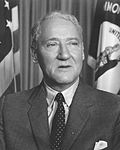| |||||||||||||||||
| |||||||||||||||||
 County results Cooper: 50-60% 60-70% 70-80% 80–90% Brown: 50–60% 60–70% | |||||||||||||||||
| |||||||||||||||||
| Elections in Kentucky |
|---|
 |
The 1966 United States Senate election in Kentucky took place on November 8, 1966. Incumbent Republican Senator John Sherman Cooper was elected to a second consecutive term in office, [a] defeating Democrat John Y. Brown Sr. in a rematch of the 1946 special election. This would be the first statewide election in Kentucky in which a Republican won Elliott County, and the only one until 2016 when Donald Trump won the county for president.

